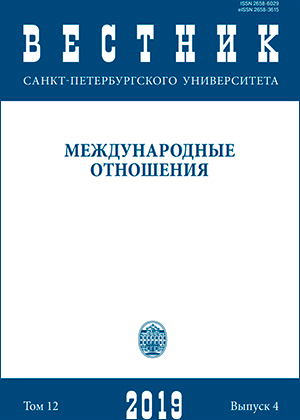Russian-American relations in a changing world: A new contribution to the discussion on the future of international order
DOI:
https://doi.org/10.21638/11701/spbu06.2019.410Abstract
A steady degradation of Russian-American bilateral relations after the beginning of the socalled New Cold War certainly represents one of the most critical destabilizing factors in the field of international security. At the same time, positions of Russia and the United States on the arrangement of the international order have become increasingly incompatible. In particular, Moscow and Washington do not share a common understanding on both basic principles and their own role in the international order of the 21st century. Not surprisingly, these realities evoke discussions and disputes within and between the academic communities in Russia and in the United States. A reviewed joint volume, published by MGIMO-university in 2019, is dedicated to the examination of a number of important issues, united by the common theme — interaction of the United States and Russia after the end of the Cold War. As a whole, the book represents an endeavor to unveil the sources of contradictions in contemporary Russian-American relations. As a point of departure, the authors accept that the current Russian-American tensions derive not from a misunderstanding by the parties of each other’s motives, or historically established prejudices and stereotypes, but rather stems from a fundamental incompatibility of interests, shaped in turn by various factors. Accordingly, this review aims not just to focus the audience’s attention on this joint volume, but also facilitate its smooth integration into the current academic debates on Russian-American relations and the prospects of the international order.
Keywords:
Russia, United States, Russian-American relations, international order
Downloads
References
Kupchan, C. (1997), After Pax Americana. Benign Power, Regional Integration, and the Sources of a Stable Multipolarity. International Security, vol. 23, no. 2, pp. 40–79.
Kupchan, C. (2002), Hollow Hegemony or Stable Multipolarity? Ikenberry G.J., ed. America Unrivaled. The Future of the Balance of Power. Cornell University Press, Ithaca, pp. 68–97.
Layne, C. (1993), The Unipolar Illusion. Why New Great Powers Will Rise. International Security, vol. 17, no. 4, pp. 5–51.
Layne, C. (2006), The Unipolar Illusion Revisited. The Coming End of the United States’ Unipolar Moment. International Security, vol. 31, no. 2, pр. 7–41.
Waltz, K. (2009), The United States: Alone in the World. Zartman W., ed. Imbalance of Power. US Hegemony and International Order. Lynne Rienner Publishers, Boulder, London.
Brooks, S., Wohlforth, W. (2008), World Out of Balance. International Relations and the Challenges of American Primacy. Princeton University Press, Princeton.
Ikenberry, J. (2002), Democracy, Institutions, and American Restraint. Ikenberry G.J., ed. America Unrivaled. The Future of the Balance of Power. Ithaca, Cornell University Press, pp. 213–238.
Mastanduno, M. (2002), Incomplete Hegemony and Security Order in the Asia-Pacific. Ikenberry G.J., ed. America Unrivaled. The Future of the Balance of Power. Ithaca, Cornell University Press, pp. 181–210.
Mastanduno, M. (2009), System Maker and Privilege Taker. US Power and the International Political Economy. World Politics, vol. 61, no. 1, pp. 121–154.
Walt, S. (2005), Taming American Power. The Global Response to US Primacy. Norton & Company, New York, London.
Wohlforth, W. (1999), Stability of a Unipolar World. International Security, vol. 24, no. 1, pp. 5–41.
Wohlforth, W. (2002), US Strategy in the Unipolar World. Ikenberry G.J., ed. America Unrivaled. The Future of the Balance of Power. Cornell University Press, Ithaca, pp. 98–120.
Goh, E. (2019), Contesting Hegemonic Order: China in East Asia. Security Studies, vol. 28, no. 3, pp. 614–644.
Kupchan, Ch. (2014), The Normative Foundations of Hegemony and the Coming Challenge to Pax Americana. Security Studies, vol. 23, no. 2, pp. 219–257.
Mastanduno, M. (2019), Partner Politics: Russia, China, and the Challenges of Extending U. S.Hegemony after the Cold War. Security Studies, vol. 28, no. 3, pp. 479–504.
Nye-jr, J. (2019), The Rise and Fall of American Hegemony from Wilson to Trump. International Affairs, vol. 95, no. 1, pp. 63–80.
Schweller, R., Pu, X. (2011), After Unipolarity. China’s Visions of International Order in an Era of US Decline. International Security, vol. 36, no. 1, pp. 41–72.
Downloads
Published
How to Cite
Issue
Section
License
Articles of "Vestnik of Saint Petersburg University. International relations" are open access distributed under the terms of the License Agreement with Saint Petersburg State University, which permits to the authors unrestricted distribution and self-archiving free of charge.




